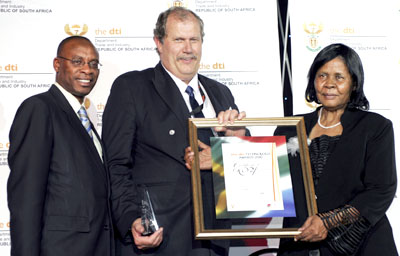Latest News Archive
Please select Category, Year, and then Month to display items
12 January 2024
|
Story Nonsindiswe Qwabe
|
Photo Sonia Small
 Since joining the UFS in 2008, Dr Grey Magaiza has worked extensively on approaches that can foster the socio-economic transformation of societies.
Since joining the UFS in 2008, Dr Grey Magaiza has worked extensively on approaches that can foster the socio-economic transformation of societies.
“The future should be one where communities can decide on their development agenda and futures. That’s the most important for me.” Dr Grey Magaiza, Deputy Director of the Centre for Gender and Africa Studies (CGAS) and Head of the Community Development programme on the Qwaqwa Campus, is passionate about capacitating communities to be agents of change and advancement. His vision for the future emphasises the empowerment of communities to take charge of their development by actively participating in decision making and the implementation of development projects that can improve their lives.
Since joining the UFS in 2008, Dr Magaiza has worked extensively on approaches that can foster the socio-economic transformation of societies. Over the years, he has crafted his research speciality into one that he is most proud of – being an interdisciplinary scientist immersed in the development of communities.
“I’m in a fortunate position of researching what I like. I say ‘fortunate’, because I’ve taken the time to understand what I’m passionate about, which is the overall field of rural livelihoods and livelihood futures – in short, community development. My research starts from an engaged university, understanding the elements that a university must use to enhance transformation and relevance to its immediate community in terms of development.”
One of the ways he has done this is by looking at social entrepreneurship as a development approach for young people in a rural setting. Through workshops with non-profit and civic organisations in Qwaqwa, Dr Magaiza has been helping these organisations to map out their needs and actively meet them through the involvement and support of external role players.
“We understand that communities are part of the national development agenda, but even that national agenda respects community knowledge and intentions and allows communities to shape their identity. A critical enabler of this is community organising. You bring back the capacity in communities to have dialogues on issues affecting them as spaces for engagement, knowledge exchange, and for people to just talk about their way forward.”
By enabling communities to define their development agenda, they can address their specific needs, challenges, and aspirations, he said. “When I look at livelihood futures, it’s quite an exciting aspect of my work – it’s like looking into a fortune tellers’ globe, because you’re not deciding for communities what they should do, but the communities themselves take those decisions.”
UFS Chemistry wins dti award
2010-11-02
 |
|
At the awards ceremony are, from the left: Director-General of Trade and Industry Mr Tshediso Matona, Prof. Andreas Roodt and the Deputy-Minister of Trade and Industry, Ms Bongi Maria Ntuli.
Photo: S Osman
|
The research group of Prof. Andreas Roodt, Head of the Department of Chemistry at the University of the Free State (UFS) in Bloemfontein, won the first prize in the category Development of Small Medium and Micro-Enterprises (SMME) at the annual Department of Trade and Industry’s (dti) award ceremony.
Prof. Roodt received the prize for the high-technology project Development of novel nuclear pharmaceuticals in the Technology and Human Resources for Industry Programme (THRIP).
The Deputy-Minister of Trade and Industry Bongi Maria Ntuli, and Director-General Tshediso Matona presented the prize at the gala dinner held at Gallagher Estate, Gauteng in October 2010.
The dti’s Annual Technology Awards recognise excellence in research and aim to raise awareness on the benefits of using technology to improve the competitiveness of enterprises, within the local and global arena. Individuals and organisations are recognised for their efforts in advancing and promoting technology interests and emerging enterprises.
The technology awards cover the achievements of three of the dti technology programmes collectively, namely THRIP, managed by the National Research Foundation (NRF); the Support Programme for Industrial Innovation (SPII) managed by the Industrial Development Corporation (IDC); and the Small Enterprise Development Agency (seda) Technology Programme (stp).
Prof. Roodt, also vice-president of the European Crystallographic Association, who has just returned from a series of lectures abroad after being elected Fellow of the Royal Society of Chemistry in the UK, has received funding in excess of R3 million over the past two years to set up a specialised laboratory for synthesising active compounds. Key partners in this project are Dr Gerdus Kemp from PETLabs Pharmaceuticals in Pretoria; Prof. Connie Medlen (pharmacologist), recently appointed affiliate professor at UFS Chemistry; as well as Prof. Deon Visser from the Inorganic Chemistry research group at the UFS.
The research aims to produce new nuclear medicinal agents for the early diagnosis of cancer, heart and brain defects, and even HIV/ Aids.
Two doctoral students, Alice Brink and Marietjie Schutte, are currently actively involved in this project. They are the recipients of prestige scholarships introduced by the UFS Rector and Vice-Chancellor, Prof. Jonathan Jansen, under the UFS Research Initiative (the Advanced Biomolecular Systems Cluster) to complete their Ph.D. studies.
Media Release
Issued by: Lacea Loader
Director: Strategic Communication (actg)
Tel: 051 401 2584
Cell: 083 645 2454
E-mail: loaderl@ufs.ac.za
2 November 2010